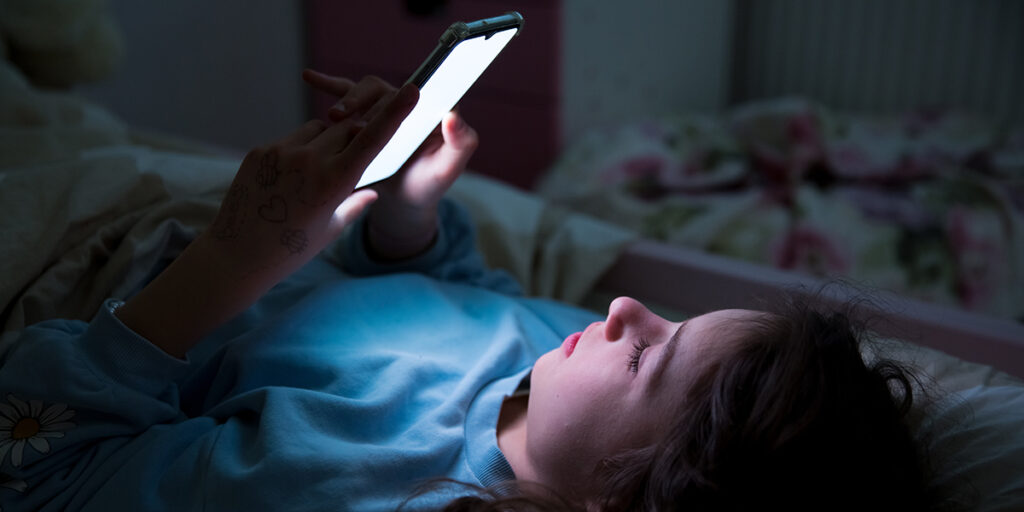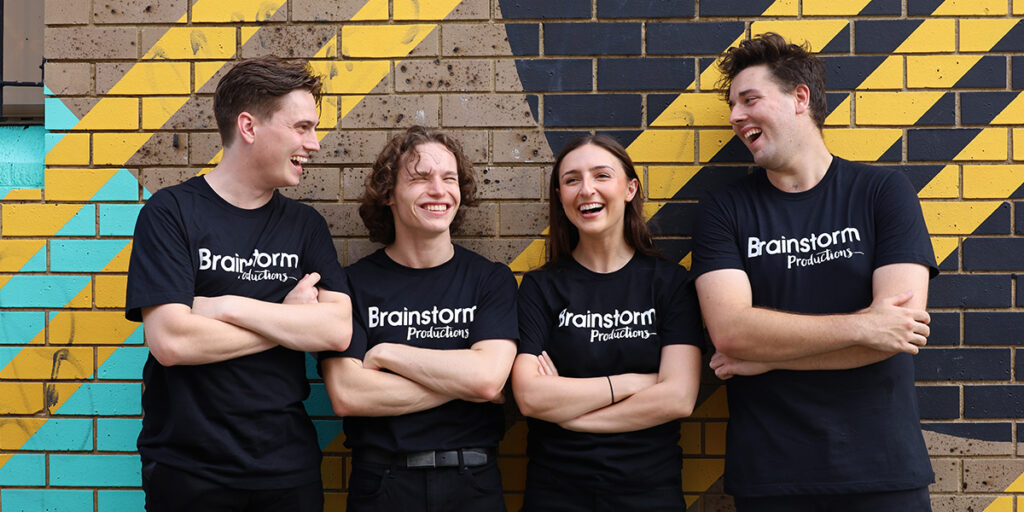We can all make a difference in the lives of those who might be struggling by having regular, meaningful conversations about life’s challenges.
Every year R U OK? run a campaign in the lead up to R U OK?Day, which is held on the second Thursday in September each year. This year R U OK? have launched the ‘Trust the Signs’ campaign, which aims to give everyone in the community skills to notice when someone needs support and the confidence to start a conversation that could change a life.
The message is simple: if you think something’s not quite the same with someone you know – there’s something going on in their life or you notice a change in what they’re doing or saying – trust your gut instinct, and take the time to reach out and start a conversation.
Trust the signs, trust your gut and ask “R U OK?”
In 2019, R U OK? commissioned market research company Colmar Brunton to conduct a survey of the general population as part of their omnibus survey. The survey, completed by a sample of 1000 people, revealed approximately two-thirds of people (63%) are not confident they know the signs that someone might be struggling, and 41% had decided not to ask someone if they were OK because they weren’t sure they knew the signs. Of those surveyed, 49% believed they’d be more confident starting a conversation if they knew the signs.
Over half of Australians surveyed said they wished someone had asked them if they were OK in the last 12 months. Sadly, young Australians aged 18 to 29 were significantly more likely than other age groups to hide it from others when they’re having a tough time.
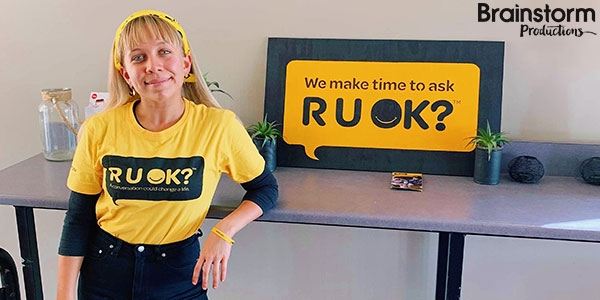
Know the signs that someone is struggling
R U OK? have identified some of the key signs to look out for that might tell you a person is struggling with life’s challenges:
What are they saying? Do they seem confused, irritable or moody? Do they seem on edge or unable to switch off? Do they seem to be worried about the future or ruminating about the past? Do they feel lonely or think they’re a burden?
What are they doing? Are they withdrawing from social activities or the people close to them? Have you noticed changes in their online behaviour? Have they lost interest in things they used to enjoy? Is it hard for them to concentrate? Are they sleeping more or less than usual? Do they seem to have lost their appetite?
What’s going on in their life? Are they having relationship issues, or have they recently lost a loved one? Are they having issues with their health? Are they under work or academic pressure?
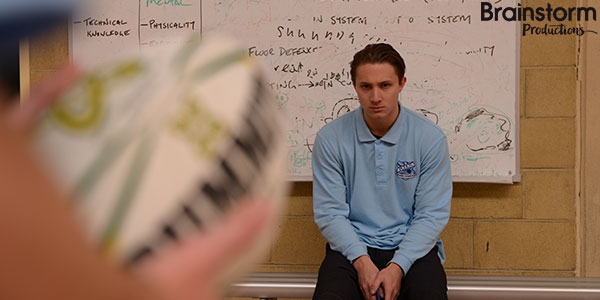
Four simple steps to help start a conversation
If you think someone is struggling, it’s important to reach out, connect and offer support. For some people, you may be the first person to ask, so these 4 simple steps could make a big difference to someone’s life:
1. Ask R U OK?
Choose a place that’s private where you won’t be interrupted, and make sure you have enough time to have a conversation, in case the answer is “no, I’m not OK”. Mention specific things that have made you concerned for them, like “you’ve been less chatty than usual” or “I’ve noticed you’ve been having a lot of days off work/school, is everything OK?”
2. Listen
Listen with an open mind and without judgment. Don’t interrupt or rush them and take what they’re saying seriously. Show that you’re listening by repeating back what you’ve heard (in your own words) and ask if you’ve understood them properly. You don’t need to fix the problem or take away their pain – just be with them, listen and let them know you genuinely care.
3. Encourage action
Help them take steps to manage their situation. If they’ve been down for two weeks or more encourage them to see a health professional and be positive about the role health professionals can play in supporting them. Children and young people should encourage their peers to speak to an adult, and then tell a trusted adult, such as a teacher, parent or school counsellor, that they are worried about someone.
4. Check in
Schedule a reminder to call them, message them or chat to them in person. Stay in touch and be there for them. Genuine care and concern can make a real difference.
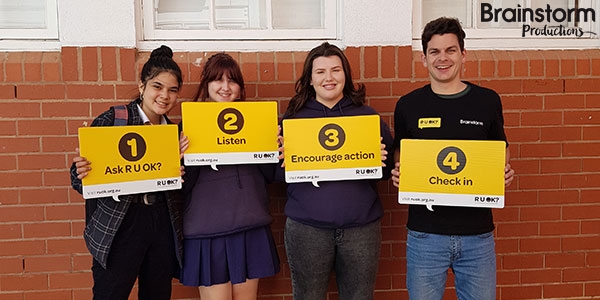
R U OK? in schools
Learning how to talk about your feelings and support others are essential life skills. That’s why R U OK? have developed a range of free education resources for primary and high schools students, including Classroom Toolkits, posters and videos. These resources help teachers start conversations about mental health and friendship in the classroom and create an environment of positive peer support where students feel confident to offer and seek help.
Below are some signs children and adolescents can look out for that might indicate a friend or classmate is feeling down:
• Not hanging out with their friends as much
• Less talkative than usual
• Lashing out at people or getting angry or upset easily
• Crying a lot
• Less interested in things they used to love, like sports or after-school activities
• Looking tired or yawning a lot
• Change in appetite – e.g. not eating as much at lunch or recess.
Children should not be expected to fix someone’s problems, be responsible for how others feel or know how to best help a person with their mental health; however, they can be encouraged to listen to their peers, let them know they care and tell a trusted adult.
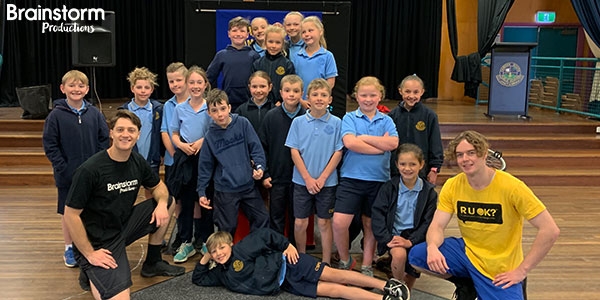
We know that adolescents in particular are more likely to speak to their friends and peers about worries and mental health than they are to an adult. So it’s important that students are equipped with skills to support their friends and that they know how to seek help from adults or health professionals.
Another way to create an R U OK? culture in the classroom and the playground is to book one of Brainstorm Productions’ student wellbeing productions for schools. Brainstorm’s school theatre productions allow students to observe the signs that someone is struggling through live theatre. The performances demonstrate to students how to look out for their peers and be a supportive friend.
For example, the primary school show ‘Buddies’ helps students develop key friendship skills, such as being kind, listening, sharing, telling the truth and helping your friends feel safe. ‘Cyberia’ is a high school performance that explores issues such as mental health, isolation, bullying, online safety and the importance of connecting with the people around us.
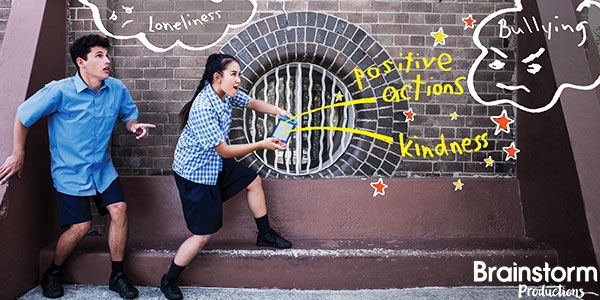
Every Brainstorm performance is followed by information about support services and mental health resources, and students are encouraged to speak to a trusted adult if they are feeling worried or distressed.
Where to go for professional support
Some conversations can be too big for friends and family. If you’re worried about someone and think they may need professional support, encourage them to connect with a trusted health professional like their GP, community health service, a school counsellor or local headspace centre.
If you or someone you know needs immediate support, Lifeline provides 24/7 telephone counselling and crisis support: 13 11 14. Kids Helpline offers free, confidential counselling and support for children and young people aged 5 to 25: 1800 55 1800. For more information about support services got to www.ruok.org.au/findhelp.
We can all make a difference in the lives of those who might be struggling by having regular, meaningful conversations about life’s challenges.
Every year R U OK? run a campaign in the lead up to R U OK?Day, which is held on the second Thursday in September each year. This year R U OK? have launched the ‘Trust the Signs’ campaign, which aims to give everyone in the community skills to notice when someone needs support and the confidence to start a conversation that could change a life.
The message is simple: if you think something’s not quite the same with someone you know – there’s something going on in their life or you notice a change in what they’re doing or saying – trust your gut instinct, and take the time to reach out and start a conversation.
Trust the signs, trust your gut and ask “R U OK?”
In 2019, R U OK? commissioned market research company Colmar Brunton to conduct a survey of the general population as part of their omnibus survey. The survey, completed by a sample of 1000 people, revealed approximately two-thirds of people (63%) are not confident they know the signs that someone might be struggling, and 41% had decided not to ask someone if they were OK because they weren’t sure they knew the signs. Of those surveyed, 49% believed they’d be more confident starting a conversation if they knew the signs.
Over half of Australians surveyed said they wished someone had asked them if they were OK in the last 12 months. Sadly, young Australians aged 18 to 29 were significantly more likely than other age groups to hide it from others when they’re having a tough time.

Know the signs that someone is struggling
R U OK? have identified some of the key signs to look out for that might tell you a person is struggling with life’s challenges:
What are they saying? Do they seem confused, irritable or moody? Do they seem on edge or unable to switch off? Do they seem to be worried about the future or ruminating about the past? Do they feel lonely or think they’re a burden?
What are they doing? Are they withdrawing from social activities or the people close to them? Have you noticed changes in their online behaviour? Have they lost interest in things they used to enjoy? Is it hard for them to concentrate? Are they sleeping more or less than usual? Do they seem to have lost their appetite?
What’s going on in their life? Are they having relationship issues, or have they recently lost a loved one? Are they having issues with their health? Are they under work or academic pressure?

Four simple steps to help start a conversation
If you think someone is struggling, it’s important to reach out, connect and offer support. For some people, you may be the first person to ask, so these 4 simple steps could make a big difference to someone’s life:
1. Ask R U OK?
Choose a place that’s private where you won’t be interrupted, and make sure you have enough time to have a conversation, in case the answer is “no, I’m not OK”. Mention specific things that have made you concerned for them, like “you’ve been less chatty than usual” or “I’ve noticed you’ve been having a lot of days off work/school, is everything OK?”
2. Listen
Listen with an open mind and without judgment. Don’t interrupt or rush them and take what they’re saying seriously. Show that you’re listening by repeating back what you’ve heard (in your own words) and ask if you’ve understood them properly. You don’t need to fix the problem or take away their pain – just be with them, listen and let them know you genuinely care.
3. Encourage action
Help them take steps to manage their situation. If they’ve been down for two weeks or more encourage them to see a health professional and be positive about the role health professionals can play in supporting them. Children and young people should encourage their peers to speak to an adult, and then tell a trusted adult, such as a teacher, parent or school counsellor, that they are worried about someone.
4. Check in
Schedule a reminder to call them, message them or chat to them in person. Stay in touch and be there for them. Genuine care and concern can make a real difference.

R U OK? in schools
Learning how to talk about your feelings and support others are essential life skills. That’s why R U OK? have developed a range of free education resources for primary and high schools students, including Classroom Toolkits, posters and videos. These resources help teachers start conversations about mental health and friendship in the classroom and create an environment of positive peer support where students feel confident to offer and seek help.
Below are some signs children and adolescents can look out for that might indicate a friend or classmate is feeling down:
• Not hanging out with their friends as much
• Less talkative than usual
• Lashing out at people or getting angry or upset easily
• Crying a lot
• Less interested in things they used to love, like sports or after-school activities
• Looking tired or yawning a lot
• Change in appetite – e.g. not eating as much at lunch or recess.
Children should not be expected to fix someone’s problems, be responsible for how others feel or know how to best help a person with their mental health; however, they can be encouraged to listen to their peers, let them know they care and tell a trusted adult.

We know that adolescents in particular are more likely to speak to their friends and peers about worries and mental health than they are to an adult. So it’s important that students are equipped with skills to support their friends and that they know how to seek help from adults or health professionals.
Another way to create an R U OK? culture in the classroom and the playground is to book one of Brainstorm Productions’ student wellbeing productions for schools. Brainstorm’s school theatre productions allow students to observe the signs that someone is struggling through live theatre. The performances demonstrate to students how to look out for their peers and be a supportive friend.
For example, the primary school show ‘Buddies’ helps students develop key friendship skills, such as being kind, listening, sharing, telling the truth and helping your friends feel safe. ‘Cyberia’ is a high school performance that explores issues such as mental health, isolation, bullying, online safety and the importance of connecting with the people around us.

Every Brainstorm performance is followed by information about support services and mental health resources, and students are encouraged to speak to a trusted adult if they are feeling worried or distressed.
Where to go for professional support
Some conversations can be too big for friends and family. If you’re worried about someone and think they may need professional support, encourage them to connect with a trusted health professional like their GP, community health service, a school counsellor or local headspace centre.
If you or someone you know needs immediate support, Lifeline provides 24/7 telephone counselling and crisis support: 13 11 14. Kids Helpline offers free, confidential counselling and support for children and young people aged 5 to 25: 1800 55 1800. For more information about support services got to www.ruok.org.au/findhelp.



